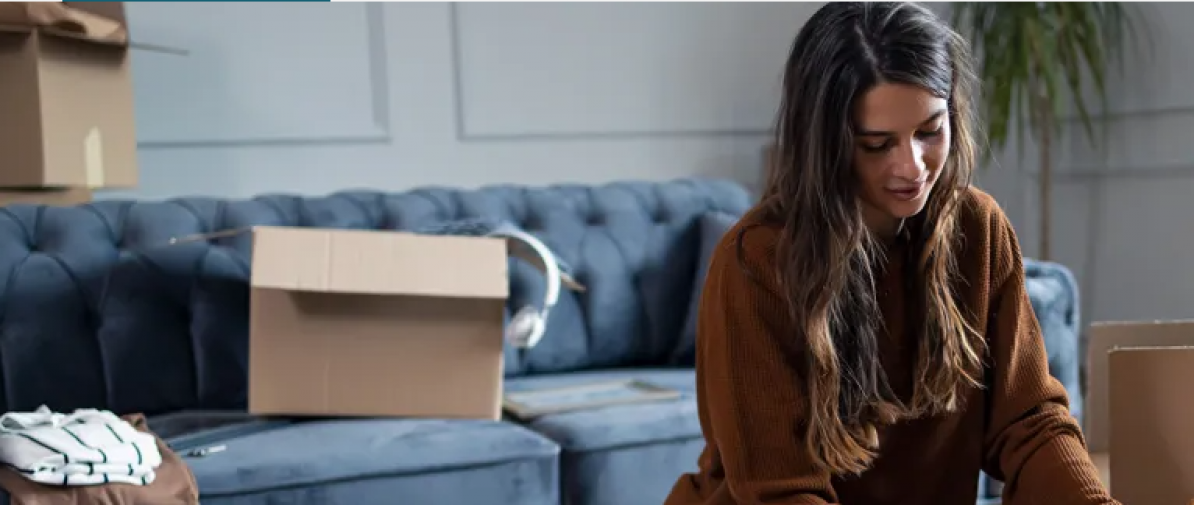

Wendy Helfenbaum is a Montreal-based journalist, content strategist and TV producer who covers real estate, architecture, design, DIY, travel and gardening.
About one-third of Canadians—equating to about five million households—are renters, and many first-time tenants don’t plan ahead for when their lease is up.
Your responsibilities as a renter vary depending on your lease, your landlord, and where you live. From how much notice to give if you’re not renewing your lease, to whether you have to repair any damage, here’s what all renters need to consider before moving out of their unit.

Most renters are required to give their landlord a security deposit when first signing a lease. But few know what it’s actually for—or if they are eligible for a reimbursement when they move out.
“I educate tenants about their responsibilities when they move in, and also send them a document when they’re leaving,” says Kim Kissinger, a REALTOR® and property manager with Royal LePage Coast Capital Realty in Victoria, British Columbia.
A security deposit covers either cleaning charges or damage caused by the tenant, and landlords may add a separate pet deposit or other clauses.. For example, in units with carpeting, Kissinger says her tenancy agreements include a professional carpet cleaning receipt with the renter’s move-in report.
“Our agreement says that tenants are obligated to hire a professional carpet cleaning company when they move out and attach a receipt, which then goes on to the next tenant,” explains Kissinger.

Video or photo walk-throughs are a great way to document the condition of your unit so there are no discrepancies when you move out, suggests Kissinger.
“We document everything when going through the unit with the tenant,” she says. “In each room, I’m either ticking off clean, dirty, damaged, or repair. If I notice a mark on the wall or a ding on the floor, I take pictures of those. I need the tenant’s eyes on the room at the same time as mine; they get a copy of the information per room with the pictures.”

Maintenance and repairs—from keeping appliances in good working order to fixing a broken window—are the property owner’s responsibility. However, it’s important to communicate with your landlord upon signing your lease to know exactly what you’re on the hook for when you move out. For example, if you remove a door from its hinges or install shelving, find out if your landlord expects you to patch any holes and re-hang the door before you leave. Ditto if you’ve painted a room.
“A tenant isn’t allowed to paint a unit unless they get authorization from the owner. So, the onus would be on the tenant either to repaint that or we hire somebody to come in,” notes Kissinger.
Speaking of hiring someone, don’t do any repairs if something breaks, she adds.
“Contact your landlord if you have a leaky faucet instead of trying to fix it yourself and maybe causing more damage—it’s their responsibility to get that fixed for you,” she says.
Kris Waye, a REALTOR® and Director of Property Management with Grassroots Realty Group in Grand Prairie, Alberta, says tenants “should be prepared to be responsible for anything that’s a direct result of their own actions.” He also explains that exterior maintenance may be part of your responsibility as well, depending on your lease.
“Tenants may or may not be responsible for exterior care such as lawn and snow removal,” he explains. “Usually in units where lawns are not common or shared, tenants are responsible for this. Tenants are usually responsible for any fines received also—if their yard is unkept and receives a bylaw fine, if the unit is a condo and they receive a sanction from the condo board, this type of thing. Often leases will state what’s required at the end of the lease also—professional carpet cleaning is common.”

While property owners can’t force tenants to keep their unit clean while they’re living there, they will hold you responsible when you vacate by not refunding your cleaning deposit if you leave things in a shambles, says Kissinger. Most property owners will document any damage or excessively dirty spaces and share photos with you.
“Kitchens and bathrooms are the worst culprits because that’s where cleanliness goes downhill,” she explains.
Not completing your responsibilities as a tenant can mean your landlord may take legal action, which can cost you lots of time and money.

This varies depending on which province you live in, so ask your REALTOR®, landlord, or municipality, especially if you’re moving from another part of the country, advises Kissinger.
“Unless they’re locked into a term, we require one month’s notice; I start with a one-year term, and then the tenants are on a month-to-month tenancy,” she explains.
Don’t forget to close out your utility bills and take all your belongings with you so your landlord doesn’t have to deal with them.
One major benefit to using a REALTOR® when renting is having access to important information upfront so there aren’t any surprises when it’s time to move on. They’ll go over any fine print with you and make sure you’re aware of your expectations as the tenant. They can also help negotiate certain elements of the lease, and even help negotiate price in some instances.
“I’m very in favour of having really good communication with tenants. If a tenant, property manager and landlord have great communication with each other, things go so much more smoothly,” says Kissinger.
Everyone’s lease and terms will be different, so it’s important to read your agreement thoroughly—or have your REALTOR® go through it—to know exactly what’s expected of you as a tenant.